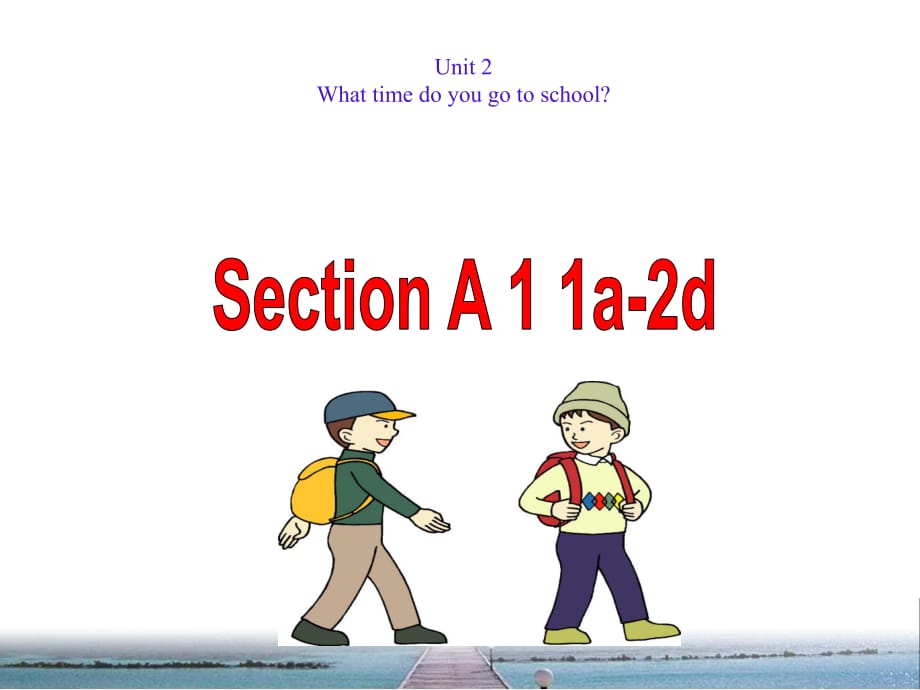《人教版七年級(jí)英語下冊(cè) Unit2 Section A 1 1a-2d (共41張PPT)》由會(huì)員分享�,可在線閱讀�����,更多相關(guān)《人教版七年級(jí)英語下冊(cè) Unit2 Section A 1 1a-2d (共41張PPT)(41頁珍藏版)》請(qǐng)?jiān)谘b配圖網(wǎng)上搜索�。
1�����、Unit 2What time do you go to school? It has no feet (腳), but it can walk with its hands.It has no mouth(嘴巴), but it can speak to you. It calls Tick(滴答),Tick, and Tick every day. 整點(diǎn)鐘讀法: six oclock順讀法: (先點(diǎn)鐘再分鐘) 6:05 six O five 6:15 six fifteen 6:30 six thirty 6:45 six forty-five 6:55 six fifty-five 9:
2��、30nine thirty 6:25six twenty-five 4:05 four fiveWhat time is it? 7:15 seven fifteen9:20 nine twenty 6:10 six tenIts 整點(diǎn)鐘讀法: six oclock順讀法: 6:05 six O five 6:15 six fifteen 6:30 six thirty 6:45 six forty-five 6:55 six fifty-five整點(diǎn) oclock 30分鐘以內(nèi) past剛好30分鐘half past30分鐘以后 to 逆讀法(先分鐘再點(diǎn)鐘)past:過��;to:差(1) 分鐘
3�����、數(shù)為30, .點(diǎn)半: 6:30 half past six 5:30 half past five(2) 分鐘數(shù)不到30, 點(diǎn)過分: (分鐘數(shù)+past+點(diǎn)鐘數(shù)) 6:05 five past six 6:10 ten past six 6:15 a quarter past six (3)分鐘數(shù)超過30, 差分點(diǎn):(60-分鐘數(shù)+to+點(diǎn)鐘數(shù)+1) 6:45 a quarter to seven 6:50 ten to seven 6:55 five to seven Read the clock time as quickly as possible. 4:04:four four; fo
4�����、ur past four 1:58 :one fifty-eight��;two to two 5:30:five thirty; half past five 6:15 : six fifteen; a quarter past six 7:30 : seven thirty; half past seven 8:45 : eight fifteen; a quarter to nine 9:00: nine oclock3:20: three twenty; twenty past three get up get dressedbrush teeth eat breakfast go to
5�����、schooltake a shower 1a Match the activities with the picture. get up _ go to school _ get dressed _ brush teeth _ eat breakfast _6. take a shower _c fbdea get upA: What time do you usually get up?get up 1c take a showerB: I usually take a shower at six forty. get dressedA: What time do you usually g
6、et dressedget dressed brush teethA: What time do you usually brush teeth?brush teeth have breakfastA: What time do you usually have breakfast?have breakfast goto schoolA: What time do you usually go to school?B: I usually go to school at half past seven. 1b Listen and match the times with the action
7��、s. get up run take a shower eat breakfast go to school What time does Tom get up? What time does Tom run? What time does Tom take a shower? What time does Tom eat breakfast? What time does Tom go to school? 1. What time do you get up on school days? _ 2. _? Rick always gets up at 6:20. 3. What time
8��、do you have breakfast? _ 4. _���? Anna never eats breakfast. 5. What time does your best friend go to school? _ I usually get up at seven oclock. What time does Anna eat breakfastShe usually go to school at six forty.What time does Rick gets upI usually have breakfast at eight oclock. 2a Listen to the
9、conversation and complete the sentences.Jim has _ brothers and _ sisters. Jims family has _ shower. two twoonly one 2b Listen again. Complete the shower schedule for Jims family.5:50 6:15 6:30 6:45 Your time schedule6:106:206:407:006:306:00 1. five fif + ty = fifty 五十 four for + ty = forty 四十 想一想: 6
10�����、0 _ 70 _ 80 _ 90 _ seventyeighty ninetysixty an interesting job funnyradio show exercise radio stationgo to work Read the conversation in 2d. Fill in the blanks.Activities timeat nineat about ten twentyat eleven at eight thirty at nightfrom twelve oclock at night to six oclock in the morning From tw
11���、elve oclock at night to six oclock in the morning.Scott has an interesting job. He works at a radio station. Scott, what time is your radio show?Role-play the conversation. 1. job與work 辨析 job是可數(shù)名詞, 主要指有報(bào)酬的工作 work是不可數(shù)名詞, 主要指要付出努力 的勞動(dòng) 鮑勃想找一份好的工作�。 Bob wants to find a good _. job always 意為“總是�����,一直” usuall
12��、y 意為“通常地�����,一直地” never 意為“從未,絕不”I _ (通常) get dressed at six forty.Jack is _ (總是) late. His grandpa _ (從未) goes to school.頻率詞alwaysneverusually 今天我有很多工作要做�。I have much _ to do today. 她每天六點(diǎn)鐘去上班。She goes to _ at six oclock. workwork 2. Thats a funny time for breakfast! time常常和介詞“for”搭配�����,表示“做的時(shí)間”����。如: We dont
13、have too much time for sports. 我們沒有太多的時(shí)間開展體育活動(dòng)��。 Time for dinner, children. Go and wash your hands, please. 孩子們�,飯好了。去洗手吧����。 3. exercise 的用法小結(jié)作動(dòng)詞,意為“鍛煉”�。如: 他爺爺每天早晨鍛煉。 His grandpa _ in the morning. 作不可數(shù)名詞����,意為“鍛煉;運(yùn)動(dòng)”�,如: 每天他都做大約十五分鐘的運(yùn)動(dòng)��。He does about fifteen minutes _ every day. exercises exercise 作可數(shù)名詞��,意為“體
14��、操�����;(技能)練習(xí)”。 我們每天做早操����。We do morning _ every day. exercises 4. station 意為“電(視)臺(tái);車站” 如: TV station 電視臺(tái) bus station 公交車站 5. oclock 意為 “ 點(diǎn)鐘”��,跟在整點(diǎn)后 如:七點(diǎn)鐘 seven oclock 6. funny意為“奇怪的����;滑稽好笑的”。 詹妮是一位滑稽的女孩�。 Jenny is a _ girl. 7. be late for 意為“做遲到” 湯姆經(jīng)常上學(xué)遲到。 Tom is always _ _ school. funny late for 一�����、用所給單詞的適當(dāng)形式填
15、空�。1. Lucys family has two _ (shower).2. An hour has _ (six) minutes. 3. My sister always _ (brush) teeth at 9:00 at night. 4. His aunt _ (work) at a radio station. showerssixtybrushesworks 二、選詞填空�。at night, be late for, early, at six forty, funny, get up 1. Alice usually _ at 6:30 in the morning.2. H
16、is uncle works from 10:00 _ to 6:00 in the morning.3. His brother never goes to school so _. 4. The lazy boy _ always _ school. 5. My sister always takes a shower _. 6. Look at that boy. Hes really _. gets up at nightis late for at six fortyearlyfunny Proverbs:Time is money. 一寸光陰��,一寸金����。Time is life.時(shí)間就是生命。Time flies.時(shí)光如梭Time and tide wait for no man.時(shí)不我待����!
 人教版七年級(jí)英語下冊(cè) Unit2 Section A 1 1a-2d (共41張PPT)
人教版七年級(jí)英語下冊(cè) Unit2 Section A 1 1a-2d (共41張PPT)

